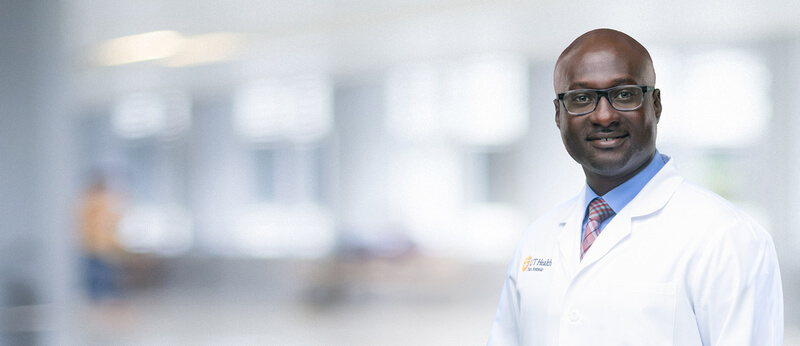Contact: Steven Lee, 210-450-3823, lees22@uthscsa.edu
SAN ANTONIO – Growing up in Ghana, Dr. Prince Otchere noticed that high blood pressure ran in his family. And after he arrived at Houston for college, he learned there was a link between cardiovascular diseases and some ethnic minorities in this country.
All that inspired him to pursue a degree in molecular genetic technology, which then led him to focus on how some cancer treatments can affect the heart. He found that as genetics could explain why his family members were more susceptible to heart disease, so could it with ethnically diverse cancer patients.
“I became keenly interested in how personalized medical care can make a difference, and particularly the intersection between molecular genetics, cancer and cardiovascular disease,” said Dr. Otchere, now a physician and assistant professor at The University of Texas Health Science Center at San Antonio, also known as UT Health San Antonio.
He is the new director of the cardio-oncology program at the Mays Cancer Center, home to UT Health San Antonio MD Anderson Cancer Center, and provides general cardiology consultation as well.
After working a year in a molecular technology lab in Houston, he moved to California to complete his medical education at Loma Linda University School of Medicine. Subsequently, he completed his internal medicine residency and cardiology fellowship focusing on cardio-oncology at Kettering Medical Center in Dayton, Ohio.
Today, Dr. Otchere’s experiences and training have developed into a strong commitment to provide compassionate cardiovascular care to cancer patients who are about to undergo radiation and chemotherapy. Sometimes, those cancer treatments cause damage to the heart and vascular system, a condition collectively called cancer therapy-related cardiac dysfunction.
This can develop during or shortly after cancer treatment – or years later, even if patients are cancer-free by then. And it can be more common in ethnic populations, which often grapple with access to proper treatment as well.
“As a public health professional, I seek to understand the social determinants of health for each of my patients and address barriers to achieving desired health outcomes,” Dr. Otchere said.
In doing so, he draws upon his own family experience and education. It’s personal to him.
“Dr. Otchere understands the stress a sudden diagnosis of cancer and its related potential of heart dysfunction places on patients,” said Allen Anderson, MD, chief of the Cardiology Division at UT Health San Antonio. “He employs a whole-person approach to patient care, including emotional and other comfort care as well.”
He also is currently enrolled in the epidemiology program at the Harvard University School of Public Health. Together with Harvard mentors, he is working on creating cardiac-risk prediction tools to help oncologists anticipate patients who are most at risk of developing heart or vascular issues.
Dr. Otchere is board-certified in cardio-oncology, echocardiography, nuclear cardiology and internal medicine. And he is a contributing author of the International Cardio-Oncology Society’s “IC-OS Board Review Manual: A Guide to Cardio-Oncology,” the first examination review book for the field.
“We are very fortunate to have someone of Dr. Otchere’s background and expertise join our faculty and patient-care operations,” said Ruben Mesa, MD, FACP, executive director of the Mays Cancer Center. “His personal experiences and training translate to extraordinary, personalized patient care. And it shows.”
The University of Texas Health Science Center at San Antonio, also referred to as UT Health San Antonio, is one of the country’s leading health sciences universities and is designated as a Hispanic-Serving Institution by the U.S. Department of Education. With missions of teaching, research, patient care and community engagement, its schools of medicine, nursing, dentistry, health professions and graduate biomedical sciences have graduated 39,700 alumni who are leading change, advancing their fields, and renewing hope for patients and their families throughout South Texas and the world. To learn about the many ways “We make lives better®,” visit http://www.uthscsa.edu.
Stay connected with The University of Texas Health Science Center at San Antonio on Facebook, Twitter, LinkedIn, Instagram and YouTube.
To see how we are battling COVID-19, read inspiring stories on Impact.
The Mays Cancer Center, home to UT Health San Antonio MD Anderson Cancer Center, is one of only four National Cancer Institute-designated Cancer Centers in Texas. The Mays Cancer Center provides leading-edge cancer care, propels innovative cancer research and educates the next generation of leaders to end cancer in South Texas. Visit www.UTHealthsaMDAnderson.org.



